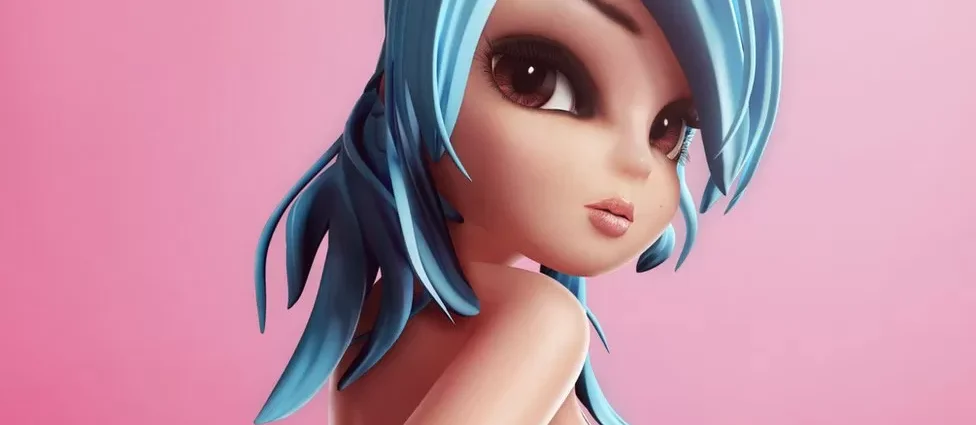Can AI popstars make it in the real world?

They sing, they dance, they model, but they don’t exist in real life – virtual influencers are trying to break out of the metaverse and into the charts.
From Alvin and The Chipmunks to Gorillaz, and Hatsune Miku to Polar, the music industry is no stranger to virtual characters as popstars.
Like many of today’s human artists, they’ve won Grammy Awards, held concerts as holograms, and can even be “cancelled” over controversial comments.
Noonoouri, a digital character created by German designer Joerg Zuber, is the latest blue-haired, doll-faced virtual influencer to land a record deal.
Created using motion capture and advanced graphics, she’s been signed to Warner Music as its first avatar artist, rubbing shoulders (virtually) with Ed Sheeran, Dua Lipa, Cardi B and Ashnikko at one of the industry’s biggest labels.
Her vocals, built in part using artificial intelligence (AI) tools, have seen her dubbed an “AI popstar”.
And while Warner Music says AI only played a minor part in the creation of Noonoouri’s vocals, her signing still comes amid growing concerns over the role AI plays in music creation, and whether it will displace or defraud artists by duplicating their sound, style or image.

Marec Lerche, head of business development at Warner Music Central Europe, says Noonoouri and digital creations like her can offer labels more experimentation and flexibility.
“You can appear in different places at the same time, you can change her style in a minute – we can make Nonooouri fly if we want, because it feels natural to her,” he says.
“She is already a digital character so there are more opportunities than with a human artist in that respect.”

Noonoouri’s pivot to music follows that of another top virtual influencer, Lil Miquela, who first began to release tracks in 2017, and has received millions of views for her music videos on YouTube.
It comes as streaming now reigns supreme in the music industry, and artists – like screenwriters and actors in Hollywood – are fighting for a bigger slice of revenues.
Musicologist Dr Shara Rambarran says virtual influencers-turned-popstars entering the arena may unsettle IRL (in real life) musicians “who want to put their music out there and not have to have that [additional] competition”.
As an almost entirely virtual creation, Warner Music’s new signing is not exactly your average artist.
Similarly to “vocaloids” like Hatsune Miku – who evolved out of voice synthesiser software into a fully sketched character – Noonoouri has been created using a combination of different technologies to virtually dance, sing and strut down runways.
She has 400,000 followers on Instagram, a modelling contract, and a doll-like appearance that can be tweaked or transformed at the click of a button.
Mr Zuber, who works at a design studio in Munich, says Noonoouri is a “lifetime project” for him.
It was fleshed out by him and his team of five people as a character that originally could speak about and highlight the world’s problems in a lifelike, 3D form.
“We started with the hair, the drawings of the fabric, the movement and everything, and I slipped into a motion capture suit to walk as her… to define her movements, her gestures and everything,” he says.

Mr Zuber adds that the team was keen to give Noonoouri a more “techie” than human sounding voice – which meant overlaying his base vocals for the character with a melodic track from a professional singer.
Algorithms were then used to automatically correct Noonoouri’s original vocal recordings and help the team match the speed, tempo and pitch of the singer’s voice.
Her signing to Warner comes against the backdrop of concerns in the music industry over the rise of the technology.
While artists such as Grimes and David Guetta have said they are embracing such tech to experiment with their music production, the likes of Sting and Ed Sheeran have criticised the use of AI. Meanwhile, Hozier recently told the BBC’s Newsnight that he would consider striking over the threat posed to the industry by AI.
- Sting warns against AI songs as he wins prestigious music prize
- Grimes says anyone can use her voice for AI-generated songs
- What do DJs and producers think of AI in dance music?
Jamie Njoku-Goodwin, chief executive of industry association UK Music, says that many in the industry are excited about the opportunities AI might give artists and producers, but figuring out the regulatory and legal landscape so it “can enable human creativity, not erode it” is key.
“It’s about knowing what content and what data AI is being trained on, [and] about ensuring there’s adequate labelling so we know whether or not a piece of music is AI-generated,” he says.
Dr Shara Rambarran has written about virtual musicians, and says that while the trend of digital popstars is unlikely to abate in future, it’s also unlikely to usurp tangible humans topping the charts.
“It’s not a new concept at all, they’ve always existed in some shape or form,” she says.
“But will it overtake everything in the music industry? I don’t think so. I think there’s going to be room for everybody.
“There’s always going to be another innovative creation we’re going to be talking about and if this doesn’t work out, something’s going to replace it.”
Read Also:
- https://www.dailybulletin.uk/technology/new-ai-systems-collide-with-copyright-law/
- https://www.dailybulletin.uk/business/barbie-movie-warner-bros-sorry-for-replying-to-atomic-bomb-memes/
- https://www.dailybulletin.uk/technology/hollywood-writers-fear-losing-work-to-ai/
- https://www.dailybulletin.uk/technology/mark-zuckerberg-threads-users-down-by-more-than-a-half/
- https://www.dailybulletin.uk/world/lizzo-accused-of-sexual-harassment-and-fat-shaming/





